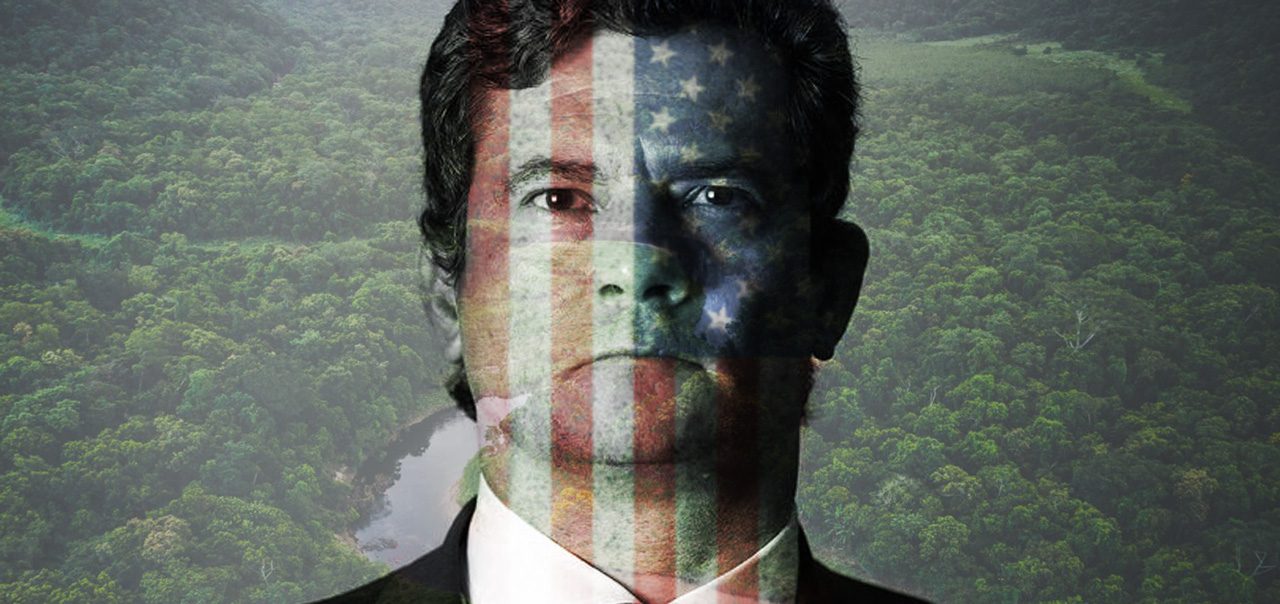Disgraced Lava Jato judge and former Bolsonaro Justice Minister Sérgio Moro’s presence at private bilateral US-Brazil meeting over the Amazon rainforest is cause for further concern. Holding no disclosed position with the US or Brazilian government, whose interests is he representing?
Behind-closed-doors negotiations between the Joe Biden administration and the Bolsonaro regime are facing fierce opposition; a new campaign urges Biden to end the secret talks over the future of the Amazon, after a coalition of 199 civil society groups delivered a letter to the US government demanding that any discussions over the future of the rainforest should include the Brazilian people.
But an account of the latest meeting leaked to Kennesaw State University’s Sentinel, reveals a new component that will cause concern and confusion in Brazil: Sérgio Moro.
Bolsonaro’s ex-Justice Minister, and disgraced Lava Jato judge brought the far-right president to power through his jailing of Lula da Silva. Following their annulment of charges against Lula, Moro now faces investigation by the Supreme Court for the felony of judicial bias in the prosecution and jailing of the former president.
At the virtual meeting, with Brazilian politicians, economists, diplomats and businessmen, US Ambassador to Brazil Todd Chapman insisted that Joe Biden’s climate leaders’ summit next week would be “Brazil’s last chance to show its environmental concern, to restore American confidence, and expand relations with the White House.”
Moro’s presence at these Amazon meetings is incongruous to say the least. He is no longer a member of the Brazilian government and he holds no disclosed position with the US government or its agencies. Who is he working for? Who is he representing?
He did recently take a partnership/directorate position with US based global consulting firm Alvarez & Marsal. When they hired him, the company introduced the former judge as an expert on “leading anti-corruption investigations” and “advising clients on regulatory strategy and compliance”.
The known timeline of Moro’s US connections dates back almost 25 years. Long before being depicted heroically in the New York Times and Time magazine, who named him among its 100 persons of the year in 2016.
From an exchange program at Harvard Law School in 1998, Moro then participated in the U.S. State Department’s 2007 International Visitor Leadership Program, “visiting US agencies and institutions responsible for preventing and combating money laundering.”
From 2009 we then see him linked to Project Bridges, a classified US effort to cultivate Brazilian public officials to deliver geopolitical objectives revealed in leaked State Department cables. The DOJ/FBI’s “informal collaboration” om Operation Lava Jato sprung from Project Bridges or Pontes, and the anti-corruption investigation was effectively operating as US agency, delivering both the political setting for Dilma Rousseff’s impeachment, and the prevention of Lula’s return to the presidency two years later.
Upon entering government in January 2019, Moro accompanied Bolsonaro to CIA headquarters in Langley, the first such visit by a Brazilian president in history. As head of the new justice and security ministry, Moro oversaw huge expansion of the FBI’s jurisdiction and reach inside Brazilian sovereign territory, including the establishment of so called Fusion intelligence gathering centers. In leaked conversations, Lava Jato chief prosecutor Deltan Dellagnol called Lula’s arrest “a gift from the CIA“.
So in what capacity and on whose behalf is Sérgio Moro attending confidential negotiations between the United States and Brazil over environmental policy? And for what country?
A clue might lie in what he is reported to have said at the meeting, and his exchange with US Ambassador Chapman. According to the anonymous account of the meeting:
“Moro, in turn, asked if there was anything the private sector could do if the Brazilian government did not cooperate on the environment, and he heard from Chapman that many American companies are demanding a more aggressive response on the environment, because they do not want to to pay on behalf of those involved in illegalities and deforestation.”
The companies most invested in Amazon deforestation are members of Wall Street lobby/think tank Council of the Americas, which is intrinsically related to the State Department, sharing many past and current staff, and holding its annual event at its headquarters the Harry S. Truman building.
Council of the Americas has breathlessly promoted Sérgio Moro, Lava Jato and the war on corruption in Brazil and Latin America, which delivered immediate benefits for its members such as Cargill, Blackrock, Rio Tinto and Chevron. Even after the fires which swept the region in 2019, as recently as February 2020 its in-house magazine Americas Quarterly published an article claiming that “Bolsonaro’s Amazon plan has actual reasons for hope“. At the 2017 Davos World Economic Forum, Brazilian Prosecutor General Rodrigo Janot told attendees that Lava Jato was “pro-market“, a political position it was not supposed to have. Two years later, with Bolsonaro in power, the US Department of Justice tried to award the Lava Jato taskforce a $682 million dollar kickback.
Regardless of administration, Republican or Democrat, whenever the United States negotiates over the Amazon it will always be on behalf of these entrenched corporate interests, alongside any new environmental concerns that may occupy the headlines.
In that sense, Moro’s participation at this meeting is perhaps not surprising at all…
[qpp]

